人教版高中英语必修三 unit1reading
- 格式:ppt
- 大小:3.06 MB
- 文档页数:21
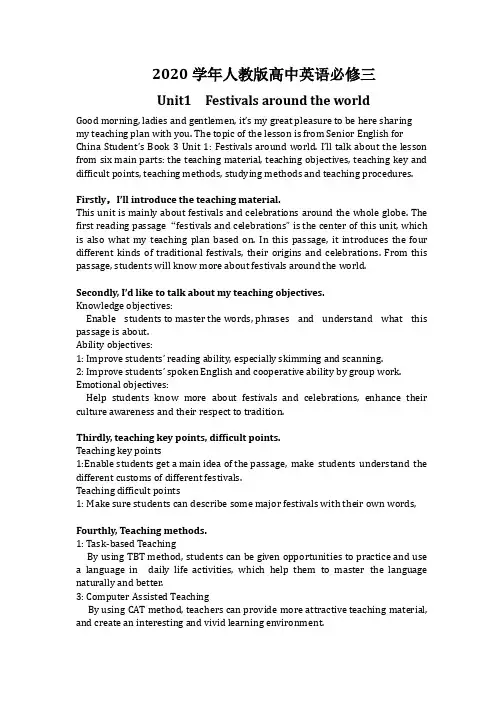
2020学年人教版高中英语必修三Unit1 Festivals around the worldGood morning, ladies and gentlemen, it’s my great pleasure to be here sharing my teaching plan with you. The topic of the lesson is from Senior English for China Student’s Book 3 Unit 1: Festivals around world. I’ll talk about the lesson from six main parts: the teaching material, teaching objectives, teaching key and difficult points, teaching methods, studying methods and teaching procedures. Firstly,I’ll introduce the teaching material.This unit is mainly about festivals and celebrations around the whole globe. The first reading passage“festivals and celebrations” is the center of this unit, which is also what my teaching plan based on. In this passage, it introduces the four different kinds of traditional festivals, their origins and celebrations. From this passage, students will know more about festivals around the world. Secondly, I’d like to talk about my teaching objectives.Knowledge objectives:Enable students to master the words, phrases and understand what this passage is about.Ability objectives:1: Improve students’ reading ability, especially skimming and scanning.2: Improve students’ spoken English and cooperative ability by group work. Emotional objectives:Help students know more about festivals and celebrations, enhance their culture awareness and their respect to tradition.Thirdly, teaching key points, difficult points.Teaching key points1:Enable students get a main idea of the passage, make students understand the different customs of different festivals.Teaching difficult points1: Make sure students can describe some major festivals with their own words, Fourthly, Teaching methods.1: Task-based TeachingBy using TBT method, students can be given opportunities to practice and use a language in daily life activities, which help them to master the language naturally and better.3: Computer Assisted TeachingBy using CAT method, teachers can provide more attractive teaching material, and create an interesting and vivid learning environment.Fifthly, studying methods.1: Task-based learning.2: Cooperative learningSixthly, Teaching procedures.1: Lead-inShow students a short video some traditional festivals’ celebrations. After watching that, ask students questions like “have you ever had these festivals?” “what do you do at these festivals?” “how do you know about these festivals?”Justification: in the beginning of the class, I want to use online video to create a lively environment in which students can get involved in more quickly, and also activate students interest and background knowledge of the topic.2: While-reading.Task 1 SkimmingDivide students into 8 groups, give them 3 minutes to glance over the title and each paragraph, then try to discuss and sum up the main idea of each and the theme of the whole passage.Justification: practice students’ ability of reading for the general idea, moreover, by group disc ussion, turn passive study to active study, and enhance students’ spoken English and the consciousness of cooperative learning.Task 2 ScanningGive students 8 minutes to read the passage carefully, then ask them questions like:1, what festivals are held to honour the dead and ancestors?2, who is honoured in India in October 2?3, what do European people do to celebrate harvest?4, what festivals are celebrated in Spring?Justification: practice students’ ability of reading for specific information. And also, by answering those questions students can have a better understanding of festivals around the world.3: Post-reading.Divide students into 8 groups, ask students to find out and discuss all the festivals and celebrations mentioned in the passage. After that, each group sends a representative to describe two festivals in front of the whole class. Justification: deepen students’ knowledge of today’s class. Make sure students can talk about festivals and celebrations by using their own words. Encourage students to express themselves in the face of people and to cooperate with others.4: Consolidation.Ask students to review the passage very quickly then complete the exercise below.Justification: review and consolidate the knowledge we’ve just learnt.5: Homework.Write an essay to introduce a festival and how it is celebrated.Justification: this activity does not only strengthen students’ understanding of different kinds of festivals and celebrations, but also improve students’ interculture awareness.。
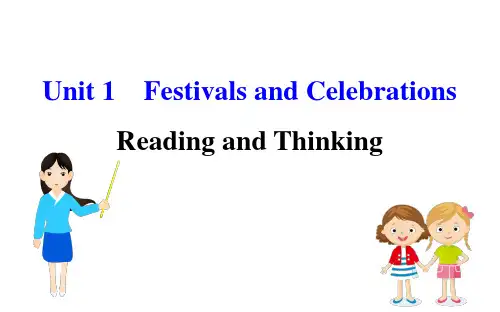
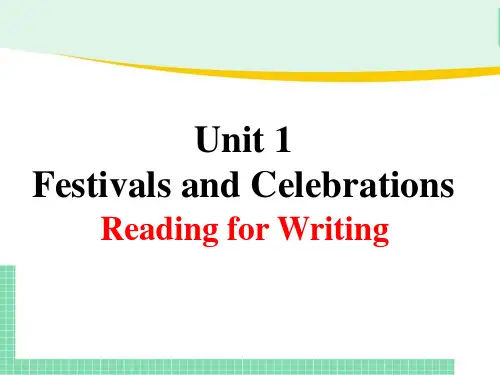
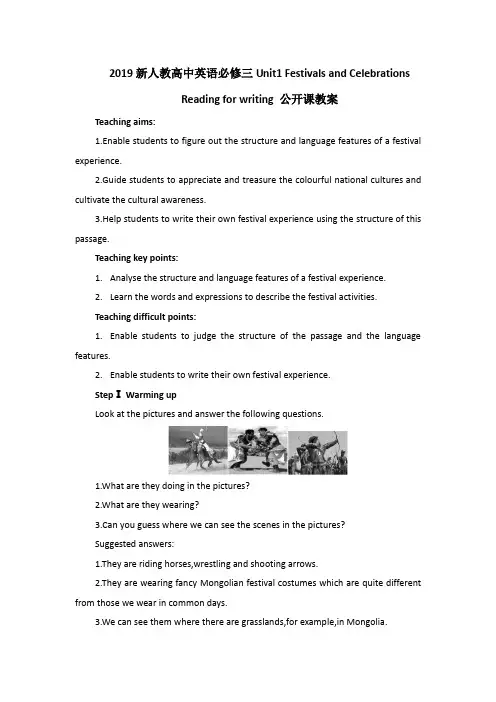
2019新人教高中英语必修三Unit1 Festivals and CelebrationsReading for writing 公开课教案Teaching aims:1.Enable students to figure out the structure and language features of a festival experience.2.Guide students to appreciate and treasure the colourful national cultures and cultivate the cultural awareness.3.Help students to write their own festival experience using the structure of this passage.Teaching key points:1.Analyse the structure and language features of a festival experience.2.Learn the words and expressions to describe the festival activities.Teaching difficult points:1.Enable students to judge the structure of the passage and the language features.2.Enable students to write their own festival experience.StepⅠ Warming upLook at the pictures and answer the following questions.1.What are they doing in the pictures?2.What are they wearing?3.Can you guess where we can see the scenes in the pictures?Suggested answers:1.They are riding horses,wrestling and shooting arrows.2.They are wearing fancy Mongolian festival costumes which are quite different from those we wear in common days.3.We can see them where there are grasslands,for example,in Mongolia.StepⅡReading the diaryActivity 1 Make a predictionFrom the title,we can find that the text is mainly about and the writer feels at it.Activity 2 Reading for main ideasRead the diary and try to find out the topic sentences of each paragraph.Para.1:______________________________________________Para.2:______________________________________________Para.3:______________________________________________Para.4:______________________________________________Para.5:______________________________________________Suggested answersActivity 1the writer’s experience of taking part in Naadam;amazedActivity 2Para. 1:I experienced the Naadam Festival in China’s Inner Mongolia Autonomous Region for the first time this year.Para. 2:On the first day,I set off to the games early with my friend Burin.Para. 3:After the opening ceremony and some amazing performances, the wrestling competition began.Para. 4:I absolutely enjoyed the archery,too,but the horse races were my favourite part.Para. 5:I’m finally back home now,feeling really tired,but celebrating Naadam with my friend was totally worth it.Activity 3 Reading for details1.Read paragraph 1,and try to find out the answers to the following questions.(1)How does the writer express the date of the festival?(2)What would be included in the following paragraphs?(3)What did the writer think of the things?Suggested answers:(1)The festival falls on the fourth day of the sixth month of the lunar calendar,usually lasting for three days.(2)Horse racing,wrestling and archery may be included in the following passage.(3)Amazing.2.Read paragraph 2,and try to find out the answers to the following questions.(1)What were people doing when I arrived at the games?(2)Was the writer describing a person,a place or a scene to us in this paragraph?Suggested answers:(1)People were preparing for the games.(2)Yes. By using“some were feeding...some were practising...and others were chatting...”,the writer described a scene where there were so many people.3.Read paragraph 3,and try to find out the answers to the following questions.(1)How did the competitors appear onto the green field?(2)How did I feel?Suggested answers:(1)The competitors danced onto the green field,waving their arms in the air as if they were eagles.(2)I was moved by their show of strength and grace.4.Read paragraph 4,and try to find out the answer to the following question.What did the writer think of the horse races?Suggested answers:The writer thought they were surprising,worrying and important,and he enjoyed them absolutely.5.Read paragraph 5,and try to fill in the blank.In this paragraph,the writer makes a brief of his experience,which works as a closing paragraph.Suggested answer:SummaryActivity 4 Reading for language features1.Rewrite the opening paragraph of the article using the following patterns.·This was my first time spending... and it was an enjoyable and exciting experience for me.·I’ll never forget...because...·I’ll always...because...2.The passage is a diary,and it is written mainly in person and tense.3.Please find out the sentences in the present tense and think them over to find out why.Suggested answers:1.This was my first time spending three days in China’s Inner Mongolia Autonomous Region experiencing the Naadam Festival represented by three events:horse racing,wrestling,and archery and it was an enjoyable and exciting experience for me.·I’ll never forget my experience at the Naadam Festival because it was my first time to watch the exciting Mongolian games of horse racing,wrestling,and archery so closely.·I’ll always remember my first experience at the Naadam Festival in China’s Inner Mongolia Autonomous Region because it was so amazing to spend three days witnessing a grand Mongolian ceremony.2.the first;simple past3.(1)The festival falls on the fourth day of the sixth month of the lunar calendar,usually lasting for three days.Naadam means “games” in Mongolian,and it is represented by three events:horse racing,wrestling,and archery,which are all so exciting to watch!(2)Mongolian wrestling is different from the wrestling in the Olympic Games.There are no rounds,and wrestlers are not separated by weight.The wrestler loses if any part of his body above his knee touches the ground.(3)Don’t worry.They’ve been riding horses all their lives.They’ll be just fine.(4)I’m finally back home now,feeling....I can’t wait!Activity 5 Reading for the structureSuggested answers:StepⅢWritingUse what you have learnt to write about a festival or a celebration you have experienced recently.Activity 1 Writing your draftMake notes of your ideas in the table and then write your draft.OutlineThe name of the festival/celebration:Main idea of each paragraphTopic sentenceof each paragraphDetails Feelings1The topic and my feeling2How I prepared for the festival/cel ebration3 Thefestival/cel ebration activities4A summary of my festival/cel ebration experienceSuggested answers:OutlineThe name of the festival/celebration:The Lantern FestivalMain idea of each paragraphTopicsentence ofeachparagraphDetails Feelings1 Thetopicand myfeelingThis wasmy first timespending theLanternFestival withmyclassmate,which was anunforgettableexperience forme.TheLanternFestival fallson...joyfully;has a great infl-uenceon Chinese people today2 How IpreparDuringtheLanternshows;guessiextremely exciteded for the festival /celebr ation festival,therewere lanternsof variousshapes andsizes hanging throughout thestreets,attracting countlessvisitors.ngriddles;received a littlegift3 Thefestival/celebrationactivitiesWe alsoatetangyuan,which tasted sweetand delicious.has asimilarpronunciation with;theround shaperepresents;set offfire-worksand watchedthe dragondancehappy and joyful4Asummary ofmyfestival/celebrationexperienceWith myclassmate, Ispent anexciting andmeaningfulLanternFestival.exciting andmeaningful;looking forward toActivity 2 Evaluating and polishing the draft1.Exchange drafts with your e the checklists to give feedback on each other’s draft.ing form correctly in the writing?2.Get your draft back and revise it.3.Polish your draft and share it with your partner.Suggested answers:The Lantern FestivalThis was my first time spending the Lantern Festival with my classmate,which was an unforgettable experience for me.The Lantern Festival falls on the fifteenth day of the first month of the lunar year.The custom of joyfully celebrating the Lantern Festival began as early as the Western Han Dynasty,and still has a great influence on Chinese people today.During the festival,there were lanterns of various shapes and sizes hanging throughout the streets,attracting countless ntern shows were also organised,which created a festive atmosphere.What impressed me most was guessing riddles,as riddle guessing was interesting and full of wisdom.Many of the lanterns had riddles written on them and we couldn’t wait to go to the owners to check our answers.At last we received a little gift,extremely excited.We also ate tangyuan,which tasted sweet and delicious.Tangyuan in Chinese has a similar pronunciation with tuanyuan and the round shape represents reunion,harmony,and happiness.Besides,we set off fireworks and watched the dragon dance.With my classmate,I spent an exciting and meaningful Lantern Festival.Looking forward to the next festival.Part ⅣHomework书面表达(一)假如你是来自美国的留学生Mike,去年你和寄宿家庭一起过了春节,请你根据以下内容,描述一下你的过节经历和感受。
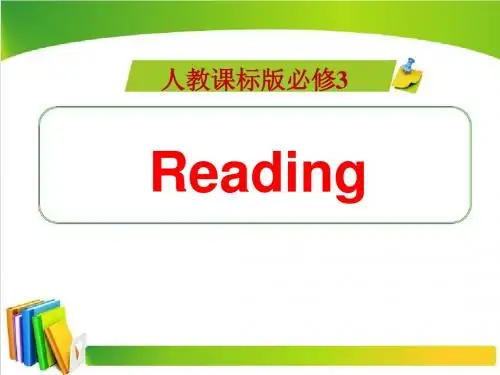
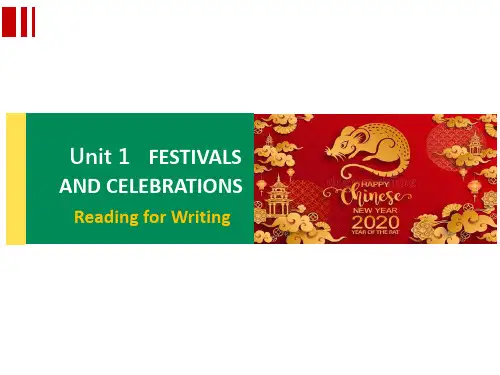
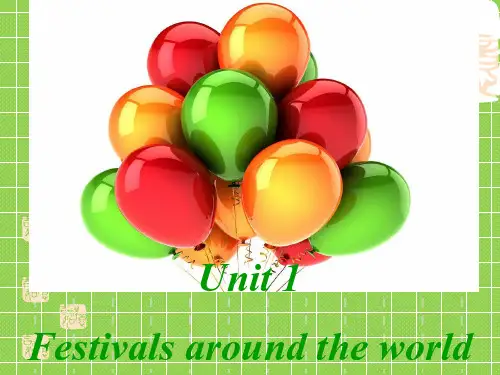
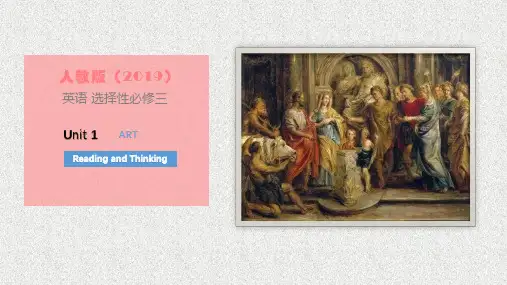
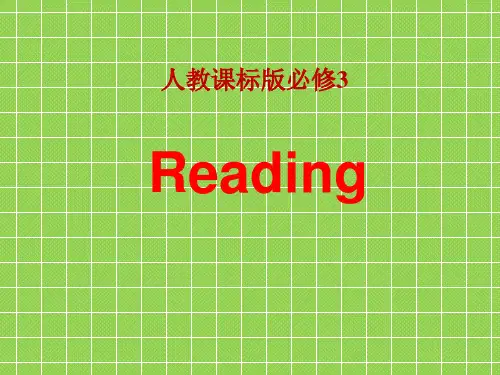
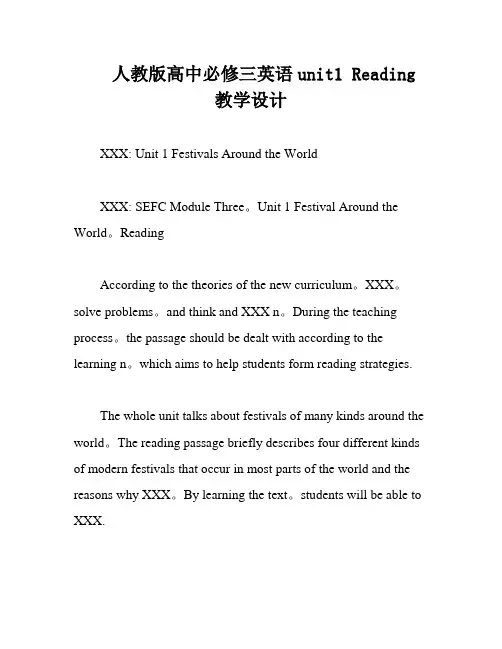
人教版高中必修三英语unit1 Reading教学设计XXX: Unit 1 Festivals Around the WorldXXX: SEFC Module Three。
Unit 1 Festival Around the World。
ReadingAccording to the theories of the new curriculum。
XXX。
solve problems。
and think and XXX n。
During the teaching process。
the passage should be dealt with according to the learning n。
which aims to help students form reading strategies.The whole unit talks about festivals of many kinds around the world。
The reading passage briefly describes four different kinds of modern festivals that occur in most parts of the world and the reasons why XXX。
By learning the text。
students will be able to XXX.The topic of this unit is related to the students' life experiences。
XXX。
due to varying English levels。
I will design reading activities of different levels to meet their XXX class.The knowledge aims of this unit are to help students master important words and phrases。
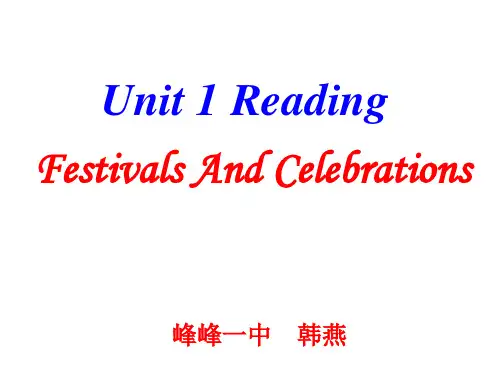
人教新课标英语必修三第一单元教案Unit 1Festivals around the WorldReading 教案Teaching goals1.To get the students to talk about festivals2.To learn about how festivals begin and how to celebrate festivals so as to enable them to learn more about different cultures while learning different language3.To develop the students’ reading skills : skimming, scanning, summarizing, and finding out details.4.To arouse the students’ interest in festivals, cultures, especially those in China,thus promote their culture awareness.Important pointsprehension of the reading part.2.Knowledge accumulation of festivals and cultures.eful words and expressions concerning festivals.Teaching aidsA computer, a projector, courseware, a tape-recorderTeaching proceduresStep 1 revisionRevise the festivals.Step 2 pre-readingWhat is your favourite holiday of the year? Why?Step 3 fast reading1.How many kinds of festivals are mentioned in the text? What are they?2. let’s get to know more about these festivals and fill in the form on P3.Ex1Step 4 careful readingParagraph 1:When did ancient people celebrate ?•at the end of winter•When good weather returned• a good harvest•animals caughtParagraph 2: Festivals of the dead1.What are festivals of the dead for?2. How do Japanese honour their ancestors?3. What do the people in Mexico do in memory of the dead?*Are there any similar festivals in China? What do do? What to eat?The Qingming FestivalParagraph 3: Festivals to honour peopleParagraph 4:Harvest Festivals1) Why are autumn festivals happy events?Because people are grateful and happy and a season of agricultural work is over.2) What do people do to celebrate it?In European countries, it is the custom to decorate churches and town halls with flowers and fruit; get together to have meals, win awards for their animals, flowers, fruit and vegetables; admire the moon Paragraph 5: Spring FestivalsParagraph 6: What are the purposes of festivals?Festivals: To have fun with each other / To let us enjoy life/ To be proud of our custom/ To forget our daily life for a little while/To honour the dead/To honour famous people/To celebrate harvest/To welcome a new year and look forward to the future/To ask people to pay attention to somethingStep 5 post readingDo T or F(1). The ancient people needn’t worry about their food. F(2). Halloween used to be a festival intended to honor the dead. T(3). Qu Y uan was a great poet whom people honor a lot in China. T(4). Mid-autumn Festival is held to celebrate the end of autumn. F(5). Easter celebrates the birth of Jesus. F(6). There is pink snow in spring in Japan. FStep 6 Group workFestivals are created. Now you’ve got the chance to create a new festival. Discuss in groups, make a plan:When the festival takes placeWhat the festival is forWhat people do at the festivalWhat people eat at the festivalSample: Peace DayIt takes place every year on January 2, the day after the New Year’s Day. At the beginning of a new year, we create such a festival in order to call for peace, to make the world a better place for everyone. People have to learn about foreign countries on that day. The TVs and newspapers will be all about foreign countries. And people are asked to eat foreign food on that day. And they are asked to talk about peace with their families, friends, and so on.HomeworkWrite an introduction of the festival your group have created.。
新教材高中英语学案新人教版必修第三册:UNIT 1 FESTIVALS AND CELEBRATIONS单元核心素养单元话题导读What’s your favourite season? What festivals happen during your favourite season?AutumnEvery year in September or October, the Mid-Autumn Festival is celebrated by the Chinese people all over the world. On this day, the moon is said to be its biggest and brightest. People like to meet in the evening and watch the moon.The Mid-Autumn Festival is important because it is a special occasion for family. It is also a day for special foods like mooncakes. There are many different kinds of mooncakes including fruit, coffee, chocolate and even ice-cream mooncakes.WinterThe Lantern Festival falls on the fifteenth day of the first lunar month. It marks the end of the Chinese New Year celebrations. In the past, lanterns were usually lit by candles and decorated with pictures of birds, animals and flowers, etc. Nowadays, most lanterns are made with light bulbs and batteries, and they come in many shapes and sizes. In the north-eastern part of China, there are even ice-lanterns. The special food is the sweet dumpling which is boiled and served inhot water.SummerThe Dragon Boat Festival falls on the fifth day of the fifth month of the lunar year. As it is in early summer, it marks the beginning of the hottest season of the year. The tradition of the Dragon Boat Festival started more than 2, 000 years ago. In the old days, dragon boat races were organised only by Chinese people. However, in recent years, people from other cultures have also taken part in the races and enjoyed the fun. There is a special food for the festival. It is called zongzi, which is sticky rice in fresh bamboo leaves.Section ⅠListening and Speaking,Reading and Thinking课前自主预习Ⅰ.重点单词1.__lantern__ n.灯笼;提灯2.__costume__ n.(某地或某历史时期的)服装;戏装3.__march__ vi. & n.行进;前进;示威游行4.__congratulate__ vt. 向(某人)道贺;(因某事)为自己感到自豪→__congratulation__ n.祝贺;恭喜5.__riddle__ n.谜语;神秘事件6.__ceremony__ n.典礼;仪式7.__range__ n.一系列;范围,界限vi. 包括;(在一定范围内)变化8.__origin__ n.起源;起因;出身→__originate__ vi. 起源→__original__ adj. 原来的;最初的n.原件;正本;原稿→__originally__ adv. 原来;起初9.__religion__ n.宗教;宗教信仰→__religious__ adj. 宗教的;笃信宗教的10.__figure__ n.人物;数字;身材vt. 认为;认定11.__charm__ n.魅力;迷人的特征;咒语→__charming__adj. 令人着迷的;迷人的;吸引人的12.__joy__ n.高兴;喜悦→__joyful__ adj. 高兴的;快乐的13.__gratitude__ n.感激之情;感谢→__grateful__ adj. 感激的;表示感谢的14.__harvest__ n.收获季节;收获;收成vi. & vt. 收割(庄稼);捕猎(动物、鱼) 15.__agriculture__ n.农业;农艺→__agricultural__ adj. 农业的16.__crop__ n.庄稼;作物;一季的收成17.__gather__ vi. 聚集;集合vt. 聚集;搜集;收割→__gatherer__ n.采集者→__gathering__ n.聚集;聚会18.__feature__ vt. 以……为特色n.特色;特征;特点19.__decorate__ vt. 装饰;装潢→__decoration__ n.装饰物→__decorative__ adj. 装饰的20.__church__ n.(基督教的)教堂;礼拜堂21.__significant__ adj. 有重大意义的;显著的→__significance__ n.意义;含义;重要性22.__fade__ vi. & vt. 逐渐消失;(使)褪色;(身体)变得虚弱23.__typical__ adj. 典型的;有代表性的;平常的→__typically__ adv. 典型地,有代表性地;向来,一向→__type__ n.类型;种类24.__evil__ adj. 邪恶的;有害的;罪恶的n.邪恶;罪恶;恶行25.__commercial__ adj. 商业(化)的;以获利为目的的→__commercialis(z)e__ vt. 使商业化;利用……牟利→__commercialis(z)ation__ n.商业化26.__medium__ n.(pl. media)媒介;手段;方法adj. 中等的;中号的27.__reflect__ vt. 显示;反映;反射→__reflection__ n.映像;思考;反映28.__belief__ n.信仰;信心;信任→__disbelief__ n.不信;怀疑;疑惑→__believe__ vt. & vi. 相信29.__faith__ n.宗教信仰;信任;相信→__faithful__ adj. 忠实的→__faithfully__ adv. 忠实地30.__occasion__ n.特别的事情(或仪式、庆典);(适当的)机会Ⅱ.重点短语1.dress (sb. ) __up__穿上盛装;装扮2.after __all__毕竟;别忘了3.range __from__…to… 从……到……之间变化4.fade __away__逐渐消失;(身体)变得虚弱5.__in__ spite of不管;尽管6.take advantage __of__利用;欺骗;占……的便宜7.__the__ media大众传播媒介8.have sth. __in__ common (兴趣、想法等方面)相同;有相同的特征9.__take__place举行;发生10.decorate… __with__…用……装饰11.play a role __in__在……中起作用12.__with__the development of随着……的发展13.drive __away__驱赶;驱车离开Ⅲ.重点句型1.However,__no matter how__ different they may seem,all over the world,the spirit of sharing joy,gratitude,love,or peace is common in all festivals.然而,无论它们看起来多么不同,在这个世界上,分享快乐、感恩、爱或和平的精神是所有节日共有的。
《Unit 1 Festivals around the world Warming Up & Reading》Ⅰ.单句语法填空1.He ________ (award) the Nobel Prize and received a reward of several thousand dollars.2.The girl sat there quite silent and still with her eyes ________ (fix) on the wall.3.You like Jazz very much, but do you know ________ origin of Jazz?4.I think Tom, as the head of a big department, should either study regularly ________ give up his job.5.The oldest man in my village has a firm ________ (believe) in the value of cold baths.6.With time going on, changes will take ________ as we have expected.7.I am a bit worried because it seems ________ our boss has found out something about the accident in the workshop.8.Although I admire you ________ your work on soil, I think you should apologize ________ the villagers ________ the water pollution.9.She looks forward to ________ (walk) in the flower-lined garden every spring.10.The old man living here is usually serious ,so some naughty boys decided to play a trick ________ him the other day.11.________ fun it is to have a chance to experience life in space!12.Every now and then I went to the library ________ (collect) information about the subject.13.She hopes to gain some experience ________ working abroad for two years.14.Many people were starved ________ death in the earthquake as a result of the delay of the supplies.15.Please don't do anything harmful ________ our nature, or we humans will have no fun ________ each other.答案:1.was awarded 2.fixed 3.the 4.or 5.belief6.place 7.as if 8.for; to; for 9.walking 10.on11.What 12.to collect 13.by 14.to 15.to; withⅡ.选择短语并用其适当的形式填空be covered with; take place; in memory of; dress up; as though; play a trick on; look forward to; day and night; have fun with; either ... or1.I do not hope that this thing ________ again.2.The stone pavilion (公园中的亭) is ________ a famous poet.3.Do I need to ________ for the concert?4.Sometimes the boys would ________ their teacher.5.We ________ your visit.6.The boss made them work ________.7.He loves to learn, travel, and ________ others.8.She dolled herself up ________ she were a girl of eighteen.9.The bandit (土匪;强盗) in a typical Western movie rides a horse and goes armed, ________ alone ________ in a group.10.The country which ________ cherry tree flowers looks as though it is covered with pink snow.答案:1.takes place 2.in memory of 3.dress up4.play a trick on 5.look forward to 6.day and night7.have fun with 8.as though 9.either; or10.is covered withⅢ.根据汉语提示完成句子1.He is always ________________________ (对我们搞恶作剧) and we find him ______________________ (难以相处).2.________________________ (随着时间的流逝), it is becoming larger and larger.(with复合结构)3.He opened his mouth ________________________ (似乎要说什么).4.________ he could not come ________(要么……要么……)he did not want to.5.Most of the people ________________________(被邀请来参加晚会的)were his old schoolmates.答案:1.playing tricks on us, hard/difficult to get along with2.With time going/passing by3.as though to say something4.Either, or 5.invited to the partyⅣ.完形填空A Fool's Day falls on April 1st. People __1__ forget the significance (意义) of the day.In March 2008, I was __2__ at Durham University with seven other Chinese students. I had __3__ to go to another university after graduation and had __4__ application (申请) forms to several __5__. Every morning I arrived at the porter's office (传达室) and waited for my fate. But no __6__ came.On April 1st, as I was eating my __7__, Huang came in, with a toothbrush __8__ in his hand. __9__ fearing that he might forget the important news, he passed me the __10__. “Morning, Wu,”he said, “I saw Mr. Green this morning. He told me that a letter had arrived in his office for you from Manchester University, and asked you to go and get it __11__ you can.” I jumped with __12__.I even didn't __13__ my breakfast and rushed to Mr. Green's office but he wasn't __14__. I then went to the secretary's room and __15__ everything to her. She opened Mr. Green's room. I looked at everything. There didn't seem to be a letter for me. “If he had asked you to pick itup from here,” said the secretary, “he would have put it in __16__ or simply left it to me.”Greatly __17__, I walked out of the room and __18__ the secretary lock it. __19__ the secretary's eyes __20__. “Sorry,” she said, “It's April Fool's Day!”1.A.sometimes B.never C.always D.seldom2.A.staying B.working C.visiting D.studying3.A.continued B.planned C.managed D.remembered4.A.returned B.taken C.handed D.sent5.A.people B.colleges C.cities D.offices6.A.application B.report C.reply D.chance7.A.dinner B.lunch C.supper D.breakfast8.A.still B.even C.yet D.already9.A.Because of B.As if C.After D.While10.A.message B.sign C.letter D.notice11.A.if B.as soon as C.when D.as fast as12.A.the news B.the letter C.joy D.luck13.A.take B.finish C.complete D.have14.A.anywhere B.in C.at D.away15.A.asked B.told C.explained D.answered16.A.the office B.his desk C.the room D.an obvious place17.A.disappoint B.disappointed C.disappointing D.disappointment18.A.watched B.made C.saw D.let19.A.Quickly B.Strangely C.Finally D.Suddenly20.A.closed B.opened C.brightened D.darkened答案与解析:1.解析:人们有时会忘记这一天的意义。